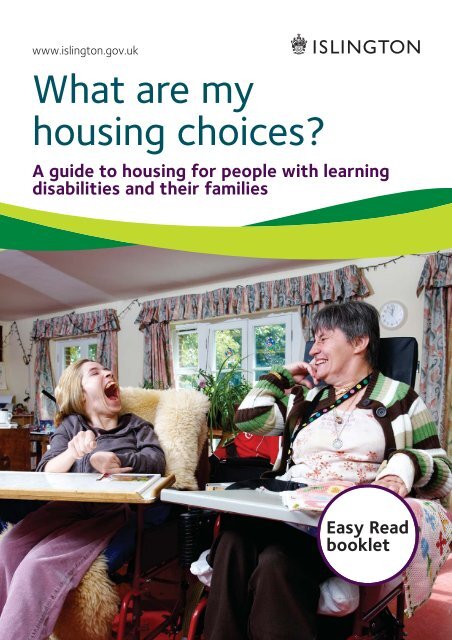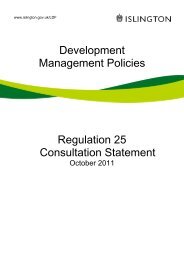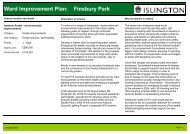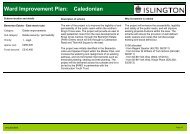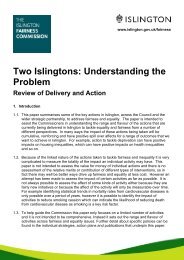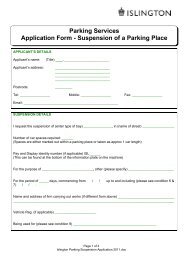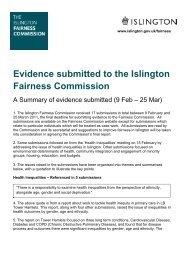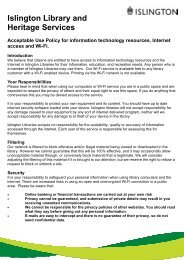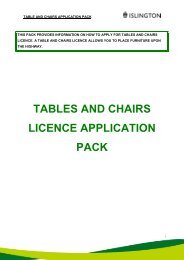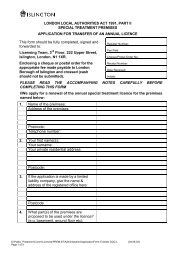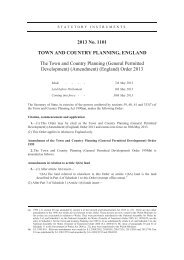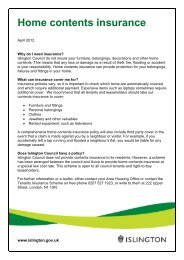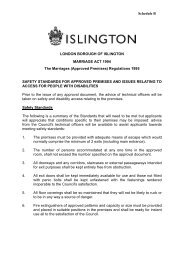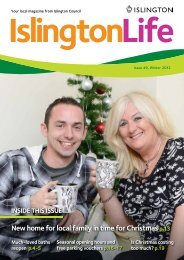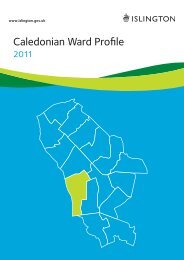What are my housing choices? Learning ... - Islington Council
What are my housing choices? Learning ... - Islington Council
What are my housing choices? Learning ... - Islington Council
You also want an ePaper? Increase the reach of your titles
YUMPU automatically turns print PDFs into web optimized ePapers that Google loves.
www.islington.gov.uk<br />
<strong>What</strong> <strong>are</strong> <strong>my</strong><br />
<strong>housing</strong> <strong>choices</strong>?<br />
A guide to <strong>housing</strong> for people with learning<br />
disabilities and their families<br />
Easy Read<br />
booklet
Finding somewhere to live<br />
There <strong>are</strong> lots of <strong>housing</strong> <strong>choices</strong> for people with learning<br />
disabilities who come from <strong>Islington</strong>. This guide will help<br />
you make the right decision.<br />
You may want to live with other people and sh<strong>are</strong> support<br />
or you may want to live on your own and be as<br />
independent as possible.<br />
<strong>What</strong>ever is right for you, you may first want to talk about<br />
the <strong>choices</strong> you have with family members, friends, and<br />
others who <strong>are</strong> close to you. This will include thinking<br />
about what you want to do during the day, as well as<br />
where and how you want to live.<br />
Early on you will also need to talk to your c<strong>are</strong> co-ordinator<br />
about your assessment and the kind of support and<br />
<strong>housing</strong> you need in order to live as safely and<br />
independently as you can.<br />
Remember, most people do not stay in the same home all<br />
their lives. There will be opportunities to move on in the<br />
future, as your needs and wants change.<br />
This guide has been written for people with learning<br />
disabilities, their families or others who help you. If you<br />
see something we have missed out, or got wrong, please<br />
tell us.<br />
3
Contents<br />
Page<br />
3 Finding somewhere to live<br />
5 How to use this guide<br />
6 Part 1: Where can I live?<br />
6 1. Living with <strong>my</strong> family<br />
6 2. Renting <strong>my</strong> home<br />
11 3. Owning <strong>my</strong> own home<br />
15 4. <strong>Islington</strong> Sh<strong>are</strong>d Lives Scheme<br />
16 5. Supported Housing Schemes, in and out of<br />
borough.<br />
19 6. Housing Network<br />
21 7. Specialist residential c<strong>are</strong> services, in and out of<br />
borough<br />
23 8. Nursing Homes, in and out of borough<br />
24 9. Specialist hospitals, in and out of borough<br />
25 Part 2:<br />
Who can help with Housing and other support?<br />
25 1. <strong>Islington</strong> <strong>Learning</strong> Disability Partnership<br />
26 2. The Transition Team.<br />
27 Part 3: Further information<br />
27 1. Frequently Asked Questions<br />
29 2. Leaflets<br />
30 3. How to contact us and useful contact information<br />
4
How to use this guide<br />
This guide tells you about the different kinds of homes you<br />
may want to live in, or move on to. This is in Part 1<br />
‘Where can I live?’ There <strong>are</strong> lots of things to think<br />
about when deciding about moving from one home to<br />
another. Different people need different homes with<br />
different kinds of support.<br />
Part 2 tells you about <strong>Islington</strong> <strong>Learning</strong> Disabilities<br />
Partnership (ILDP) and the Transition Team. It tells you<br />
how decisions <strong>are</strong> made about the kind of <strong>housing</strong> and<br />
amount of support you can get.<br />
Part 3 gives useful Information including some frequently<br />
asked questions and a list of leaflets that <strong>are</strong> available from<br />
<strong>Islington</strong> <strong>Learning</strong> Disability Partnership (ILDP).<br />
Start by reading the Contents page, and deciding what<br />
you want to know first. You can go back to the Contents<br />
page anytime, to find more information. Some information<br />
has been written in separate leaflets which you can get<br />
from the <strong>Islington</strong> <strong>Learning</strong> Disability Partnership<br />
(ILDP).<br />
5
Part 1:<br />
Where can I live?<br />
<strong>Council</strong><br />
Private<br />
1. Living with <strong>my</strong> family<br />
You may want to go on living with your family. However,<br />
many people want support to move on from their family<br />
home as they reach their mid or late 20’s.<br />
<strong>What</strong>ever age is best for you and your family c<strong>are</strong>rs, Part<br />
1 of this guide will tell you about the <strong>housing</strong> <strong>choices</strong> you<br />
have.<br />
2. Renting <strong>my</strong> home<br />
There <strong>are</strong> two ways to rent your Home;<br />
Renting from the <strong>Council</strong> or a Housing Association<br />
Renting from a private landlord<br />
<strong>Council</strong> and <strong>housing</strong> association homes<br />
<strong>What</strong> is it? – when you pay rent to live in a property<br />
owned and managed by either the <strong>Council</strong> or a Housing<br />
Association.<br />
Housing associations <strong>are</strong> independent organisations that<br />
provide <strong>housing</strong> for people in <strong>housing</strong> need. You need to be<br />
on the council’s <strong>housing</strong> register if you would like to move<br />
into a <strong>housing</strong> association property.<br />
In <strong>Islington</strong> if you want to rent your home from the <strong>Council</strong><br />
or a Housing Association you need to be on <strong>Islington</strong><br />
<strong>Council</strong>’s Housing Register.<br />
The Housing Register is a list of people who would like to<br />
rent a home from the <strong>Council</strong> or a Housing Association.<br />
6
16+<br />
Who can apply?<br />
Anyone over 16 years old can apply to join the Housing<br />
Register.<br />
You may not be able to apply if it is against the law for you<br />
to live or work in the UK.<br />
= points<br />
How do I apply?<br />
You can make an application for the Housing Register in<br />
the following ways.<br />
Download a copy of the application form from<br />
www.islington.gov.uk/<strong>housing</strong><br />
Book an appointment to see a Housing Options Officer<br />
Make an application over the telephone<br />
For appointments and telephone applications, please call<br />
the number below:<br />
Housing Options Appointment Line<br />
Tel: 020 7527 4140<br />
Open 9.30am – 12.00pm Monday, Tuesday, Thursday and<br />
Fridays.<br />
Everyone who applies to join the Housing Register needs<br />
to show;<br />
Details of current and previous addresses<br />
The <strong>Council</strong> look at Housing Register applications and<br />
give points based on your <strong>housing</strong> need.<br />
Staff based at ILDP can help you make an application to go<br />
on the Housing Register. and also check the progress of<br />
your <strong>housing</strong> application for you.<br />
7
Things to think about<br />
Tenancy - when you rent a council or Housing Association<br />
home you <strong>are</strong> a tenant and you have a tenancy agreement.<br />
A Tenancy Agreement is - a legal document that says<br />
you can live in your home as long as you pay the rent and<br />
follow the rules in the agreement.<br />
As a council or Housing Association tenant you have<br />
more rights than a private tenant. You can only lose your<br />
tenancy if you break certain rules, and if a judge agrees.<br />
Rent - council and <strong>housing</strong> association rents may be lower<br />
than the cost of renting a private home and can usually be<br />
paid with Housing Benefit. Housing Benefit is changing;<br />
you must get up to date information at the time of<br />
applying on what <strong>housing</strong> benefit you may be entitled to.<br />
Repairs - a council or <strong>housing</strong> association will carry out<br />
most of the repairs to your home.<br />
Demand - many people want to rent a council or <strong>housing</strong><br />
association home in <strong>Islington</strong> but only a few homes <strong>are</strong><br />
available each year. You may have to wait a long time<br />
before you can live in a council or <strong>housing</strong> association<br />
home.<br />
Choice - you may not have much choice about where you<br />
live, as council and <strong>housing</strong> association homes <strong>are</strong> only in<br />
certain parts of <strong>Islington</strong>.<br />
Support - If you need support to live independently you<br />
should arrange this before you move into your new home.<br />
8
Want to find out more?<br />
Details of how to contact the Housing Options team <strong>are</strong><br />
in Part 3 of this booklet.<br />
You can also rent a home from a private landlord.<br />
<strong>What</strong> is it?<br />
When you pay rent to a private landlord to live in a home<br />
they own.<br />
A Private landlord is a person or a company who owns a<br />
house that is independent of a council or a <strong>housing</strong><br />
association.<br />
Only a small number of council or <strong>housing</strong> association<br />
homes become available every year so renting from a<br />
private landlord can be one of the best and fastest ways<br />
to live in your own home in <strong>Islington</strong>.<br />
How do I apply?<br />
Anyone can rent from a private landlord. You usually have<br />
to pay a deposit and pay some rent before you can move<br />
into a private home. If you rent your home through a<br />
lettings agency you may have to pay them a fee too.<br />
Things to think about<br />
Tenancy - when you rent a private home you <strong>are</strong> a tenant<br />
for 6 or 12 months. At the end of the 6 or 12 months<br />
your private landlord decides if you can live there for<br />
longer.<br />
9
Rent - private rents <strong>are</strong> usually higher than council or<br />
<strong>housing</strong> association rents. Some rents <strong>are</strong> higher than<br />
Housing Benefit will pay. You usually have to pay a<br />
deposit and pay some rent before you can move into a<br />
private home. If you rent your home through a lettings<br />
agency you may have to pay them a fee too.<br />
Housing Benefit – if you get benefits, or you have a low<br />
income, you can claim Housing Benefit to pay some or all<br />
of your rent. The <strong>Council</strong>’s benefits section can help you<br />
claim Housing Benefit. Some private landlords will not<br />
take tenants who <strong>are</strong> on Housing Benefit. Housing Benefit<br />
is changing; you must get up to date information at the<br />
time of applying on what <strong>housing</strong> benefit you may be<br />
entitled to.<br />
Repairs - a private landlord will usually carry out the<br />
repairs. Check this in your contract before signing.<br />
Demand - you can rent all types of homes from private<br />
landlords. You can choose to rent a home with friends or<br />
family. In some private homes you may sh<strong>are</strong> a bathroom<br />
or kitchen with others. In other private homes you have<br />
your own bathroom and kitchen.<br />
Choice - you have much more choice about the part of<br />
<strong>Islington</strong> you live in when you rent a home privately.<br />
Support - if you need support to live on your own, talk<br />
this over with your C<strong>are</strong> Co-ordinator when deciding what<br />
kind of home you want.<br />
10<br />
If you <strong>are</strong> homeless<br />
If you <strong>are</strong> homeless or at risk of becoming homeless you<br />
should go to the Housing Aid Centre where a <strong>housing</strong><br />
officer will advise you what to do.<br />
Northway House, The Housing Aid Centre,<br />
257 Upper Street, N1 1RU Tel. 020 7527 2000
3. Owning <strong>my</strong> own home<br />
There <strong>are</strong> several ways to own a home;<br />
Sh<strong>are</strong>d ownership<br />
Housing for Long-term Disabilities (HOLD)<br />
Buy your home outright<br />
Sh<strong>are</strong>d Ownership<br />
Sh<strong>are</strong>d ownership is one way to buy your home.<br />
<strong>What</strong> is it?<br />
when you buy a sh<strong>are</strong> of your home and rent the other<br />
sh<strong>are</strong>. A <strong>housing</strong> association usually owns the other sh<strong>are</strong>.<br />
You can buy as much of the home as you want. The<br />
smallest amount you can buy is a quarter of the total value<br />
of the home.<br />
You can buy a sh<strong>are</strong> of your home by getting a loan from a<br />
bank or a building society. Or you can pay for it with cash<br />
or savings.<br />
Loan - a sum of money borrowed from a bank or building<br />
society. You have to pay the money back over a fixed<br />
number of months or years, and pay an extra cost called<br />
interest.<br />
You may be able to use Income Support to pay interest on<br />
your loan. And you may be able to get Housing Benefit to<br />
pay rent on the sh<strong>are</strong> of the home you do not own.<br />
Housing Benefit is changing; you must get up to date<br />
information at the time of applying on what <strong>housing</strong><br />
benefit you may be entitled to.<br />
11
Who can apply?<br />
Anyone can apply. <strong>Council</strong> and <strong>housing</strong> association tenants<br />
and local people on the Housing Register <strong>are</strong> given the<br />
first chance to buy sh<strong>are</strong>d ownership homes. You can only<br />
qualify for sh<strong>are</strong>d ownership if you can afford to buy a<br />
sh<strong>are</strong> of the home you would like to live in.<br />
Want to find out more?<br />
Metropolitan Homeownership run the sh<strong>are</strong>d ownership<br />
schemes in <strong>Islington</strong>.<br />
Metropolitan Homeownership<br />
The Grange, 100 High Street, N14 6PW<br />
Tel. 020 8920 7777<br />
Web. www.mho.co.uk<br />
Housing for Long-term Disabilities (HOLD)<br />
This is the sh<strong>are</strong>d ownership scheme for people with<br />
long-term disabilities, which is called HOLD.<br />
<strong>What</strong> is it?<br />
HOLD is a scheme funded by the Government through<br />
Housing Associations. The key difference here is that the<br />
buyer is able to choose a property from the open market.<br />
12<br />
Things to think about<br />
Security - If you own part of your home you have more<br />
security than a council, <strong>housing</strong> association or private<br />
tenant.<br />
Cost - when you get a sh<strong>are</strong>d ownership home you will<br />
need to pay<br />
A deposit to pay for part of the sh<strong>are</strong>.<br />
The rest of the sh<strong>are</strong> with a loan from a bank or building<br />
society.
Rent on the sh<strong>are</strong> of the home you do not own.<br />
A Service Charge. This is a fee paid to a landlord for<br />
services to keep your home in good condition. It covers<br />
things such as cleaning common <strong>are</strong>as and gardening.<br />
Risk - you need to be sure that you can afford to pay all<br />
the rent, mortgage and service charge. You should get<br />
independent advice about this<br />
Choice - you have more choice about the type of home<br />
and the <strong>are</strong>a you live in.<br />
Repairs - you have to pay for all repairs to your home.<br />
Want to find out more?<br />
For information on properties which <strong>are</strong> available you can<br />
look at the First Steps website;<br />
http://www.firststepslondon.org/index.asp<br />
For more information on obtaining a mortgage through the<br />
HOLD scheme please contact MySafeHome Limited:<br />
http://www.<strong>my</strong>safehome.info<br />
MySafeHome Limited<br />
1 Sycamore Court<br />
Birmingham Road<br />
Allesley<br />
Coventry<br />
CV5 9AU<br />
Tel: 08000 121 333<br />
13
Buying your home outright<br />
<strong>What</strong> is it?<br />
You own the home that you live in. You can choose any<br />
home as long as you have the money to pay for it.<br />
You can buy a home by getting a loan from a bank or<br />
building society or using your savings.<br />
Trusts<br />
A family can make sure children have money when they<br />
get older by setting up a trust. Money or property can be<br />
put into the trust, and it does not belong to the children.<br />
Things to think about<br />
A trust is one of a few ways to own a home or have<br />
money that does not<br />
Affect your benefits<br />
Remove the duty of social services or the NHS to<br />
provide c<strong>are</strong> or support.<br />
You <strong>are</strong> also protected against charges that a local council<br />
may make against home owners. You will need to find<br />
someone you trust who can be a trustee for the<br />
discretionary trust.<br />
14<br />
Want to find out more?<br />
You can get in touch with Mencap Trust Company. They<br />
also run courses on discretionary trusts.<br />
Tel. 020 7696 6925<br />
Email. willsandtrusts@mencap.org.uk<br />
Web: www.mencap.org.uk
4. <strong>Islington</strong> Sh<strong>are</strong>d Lives Scheme<br />
<strong>What</strong> is it?<br />
The Sh<strong>are</strong>d Lives Scheme means that you live in the<br />
family home of a registered Sh<strong>are</strong>d Lives C<strong>are</strong>r who has<br />
been matched with you so that they <strong>are</strong> able to meet your<br />
needs. The scheme is inspected by the C<strong>are</strong> Quality<br />
Commission (CQC).<br />
A Sh<strong>are</strong>d Lives C<strong>are</strong>r supports you to do daily tasks such<br />
as:<br />
visits to the doctor and dentist<br />
doing housework such as cleaning your room or washing<br />
your laundry<br />
carrying out ‘personal c<strong>are</strong>’ if you need it.<br />
Who can apply?<br />
ILDP will work with you to find out if a Sh<strong>are</strong>d Lives<br />
Scheme would give you the support you need.<br />
Where <strong>are</strong> they?<br />
Most Sh<strong>are</strong>d Lives C<strong>are</strong>rs <strong>are</strong> in <strong>Islington</strong> or close by, but<br />
some <strong>are</strong> further away.<br />
Things to think about<br />
If you move into a Sh<strong>are</strong>d Lives Scheme you will sh<strong>are</strong> a<br />
home with other people and become part of their family.<br />
You will get most of the day to day support you need from<br />
the C<strong>are</strong>r and their family.<br />
15
5. Supported Housing Schemes, in and out of<br />
borough<br />
<strong>What</strong> is it?<br />
Supported <strong>housing</strong> is a <strong>housing</strong> scheme where support<br />
for day to day living is provided. Supported <strong>housing</strong> may be<br />
provided in a sh<strong>are</strong>d house or in a number of flats which<br />
may or may not be in the same building.<br />
You can get support with the following:<br />
Personal c<strong>are</strong><br />
Housework<br />
Paying bills and<br />
Going out in the community<br />
There <strong>are</strong> different kinds of supported <strong>housing</strong>:<br />
You can have your own flat with a bedroom, kitchen,<br />
sitting room and bathroom which is part of a group of<br />
flats. You may also have a sh<strong>are</strong>d living <strong>are</strong>a, where you<br />
can meet with the other people you live with.<br />
You can live in a sh<strong>are</strong>d building and have your own<br />
bedroom but you sh<strong>are</strong> the kitchen, bathroom and living<br />
room.<br />
There may be separate rooms or a flat for staff to work<br />
in and sleep in if the supported <strong>housing</strong> provides a staff<br />
sleep-in service over night.<br />
Supported <strong>housing</strong> schemes will provide different levels of<br />
support which range from low to very high levels of<br />
support. There is a leaflet available from ILDP which<br />
describes the schemes in more detail - Supported<br />
Accommodation in <strong>Islington</strong> for People with <strong>Learning</strong><br />
Disabilities.<br />
16
High support<br />
Medium<br />
support<br />
Low support<br />
In low level supported <strong>housing</strong> schemes, the staff <strong>are</strong> not<br />
usually based in the building but will visit at agreed times<br />
to offer you support. In medium and high level supported<br />
<strong>housing</strong> schemes the staff <strong>are</strong> usually based in the building<br />
that you live in. In high level supported <strong>housing</strong> schemes<br />
staff <strong>are</strong> available 7 days a week, 24 hours a day.<br />
Where <strong>are</strong> they?<br />
There <strong>are</strong> several supported <strong>housing</strong> schemes in <strong>Islington</strong>,<br />
and more <strong>are</strong> being planned. Some of these <strong>are</strong> for people<br />
with very high needs. We can also sometimes find<br />
supported accommodation schemes in other boroughs.<br />
How can I apply?<br />
<strong>Islington</strong> <strong>Learning</strong> Disability Partnership (ILDP) will<br />
work with you to find a supported <strong>housing</strong> scheme with<br />
the right amount of support for you. Details of how to<br />
contact ILDP <strong>are</strong> in Part 3 of this booklet.<br />
Things to think about<br />
Living with other people - do you want to live with<br />
other people? If you live in supported <strong>housing</strong> you could<br />
sh<strong>are</strong> some of your home, such as the kitchen, bathroom<br />
and living room with other people or you could sh<strong>are</strong> a<br />
building. In most schemes there will usually be other<br />
people around.<br />
When you live in supported <strong>housing</strong> staff will help you to<br />
do most of the things that you need help with. The help<br />
you get will depend on your assessment. It might include:<br />
helping you find things to do during the day that you<br />
want to do<br />
17
shopping and cooking<br />
doing your laundry and cleaning your room or flat<br />
looking after your personal c<strong>are</strong> needs<br />
Tenancy - if you decide to live in a supported <strong>housing</strong><br />
scheme, you will have to sign a tenancy agreement, and<br />
pay rent and a service charge. In most cases your Housing<br />
Benefit will cover this.<br />
Housing Benefit - Housing benefit is changing; you must<br />
get up to date information at the time of applying on what<br />
<strong>housing</strong> benefit you may be entitled to.<br />
18
6. Housing Network<br />
<strong>What</strong> is it?<br />
In a Housing Network you will live in your own home,<br />
which is usually a council or <strong>housing</strong> association flat. There<br />
will be other people living in flats nearby who <strong>are</strong> also part<br />
of the Housing Network.<br />
Housing Networks <strong>are</strong> for people with learning disabilities<br />
who <strong>are</strong> more independent and who <strong>are</strong> usually able to<br />
carry out their own personal c<strong>are</strong> and cook for themselves.<br />
Everyone in the group of homes is supported by a<br />
community living volunteer who lives close by.<br />
The volunteer provides support and advice to help you<br />
keep your tenancy.<br />
Housing Network Members meet other members and<br />
take part in activities together. This helps you to make<br />
friends and gives you the chance to take part in local<br />
activities.<br />
You get support from Housing Network staff about once<br />
a week for a few hours. They will help you to;<br />
Pay your Bills<br />
Look for a Job<br />
Go to college or do activities in your local <strong>are</strong>a.<br />
Things to think about<br />
Tenancy - when you rent a council or Housing<br />
Association home you <strong>are</strong> a tenant and you have a<br />
tenancy agreement.You can only lose your tenancy if you<br />
break certain rules, and if a judge agrees.<br />
19
Tenancy Agreement - a legal document that says you<br />
can live in your home as long as you pay the rent and<br />
follow the rules in the agreement.<br />
Rent - council and <strong>housing</strong> association rents may be lower<br />
than the cost of renting a private home and can usually be<br />
paid with Housing Benefit. Housing Benefit is changing;<br />
you must get up to date information at the time of<br />
applying on what <strong>housing</strong> benefit you may be entitled to.<br />
Repairs - a council or <strong>housing</strong> association will carry most<br />
of the repairs to your home.<br />
Want to apply?<br />
To be considered for a <strong>housing</strong> network you must be quite<br />
independent. and You will be assessed by the Housing<br />
Network Manager who will find out what kind of support<br />
you need and if you <strong>are</strong> able to live on your own.<br />
A Housing Register application will also have to be<br />
completed, so that you can get your own flat.<br />
20<br />
Want to find out more?<br />
<strong>Islington</strong> <strong>Learning</strong> Disability Partnership (ILDP) will<br />
work with you to decide if this is the right service for you.<br />
Details of how to contact ILDP <strong>are</strong> in Part 3 of this<br />
booklet.
7. Specialist residential c<strong>are</strong> services, in and<br />
out of borough.<br />
<strong>What</strong> is it?<br />
Residential c<strong>are</strong> homes <strong>are</strong> for people who need a high<br />
level of skilled support 24 hours a day. They <strong>are</strong> an<br />
alternative to high and very high supported<br />
accommodation services for some people.<br />
You have your own bedroom, and often a bathroom, and<br />
you sh<strong>are</strong> a kitchen and living space with the other people.<br />
Usually about 8 people sh<strong>are</strong> a house, but some homes<br />
have more people.<br />
The support provided can include some or all of the<br />
following:<br />
personal c<strong>are</strong> needs such as bathing or dressing<br />
day to day tasks such as laundry, preparing a snack or<br />
shopping<br />
helping you to become more independent with things<br />
such as managing your money, staying safe or using<br />
buses.<br />
taking part in community activities, such as going to<br />
college, the leisure centre, cafes, theatres or going on<br />
holiday.<br />
All residential c<strong>are</strong> homes <strong>are</strong> registered with the C<strong>are</strong><br />
Quality Commission (CQC). You can find out more about<br />
them in a separate leaflet which is available at ILDP or on<br />
the CQC website.<br />
Who can apply?<br />
ILDP will work with you to find out if a residential c<strong>are</strong><br />
home and support would meet your needs.<br />
21
Where <strong>are</strong> they?<br />
There <strong>are</strong> two residential c<strong>are</strong> homes in <strong>Islington</strong>, and many<br />
in other London boroughs and further away. If ILDP does<br />
not have a vacancy in the right service for you in <strong>Islington</strong><br />
at the time you need it, ILDP will look for services as close<br />
to <strong>Islington</strong> as possible. When a vacancy in <strong>Islington</strong><br />
becomes available, you may want to discuss moving back.<br />
Things to think about<br />
Support - do you need skilled staff available to support<br />
you in a planned way 24 hours a day?<br />
Sharing - <strong>are</strong> there any advantages for you in sharing a<br />
house with others?<br />
Becoming independent - do you want the help they<br />
offer for a limited time to help you move on more<br />
independently in the future?<br />
Paying for residential c<strong>are</strong> services - ILDP usually pays<br />
for most of your <strong>housing</strong> and support costs in a residential<br />
c<strong>are</strong> home. You pay your benefits towards the cost of this.<br />
For more information see the leaflet - Charges for C<strong>are</strong><br />
Homes.<br />
You will be able to keep a weekly allowance of about £20,<br />
and in addition you may be entitled to Disability Living<br />
Allowance if you have mobility needs.<br />
You do not have a tenancy agreement with a landlord in a<br />
residential c<strong>are</strong> home and so you cannot apply for Housing<br />
Benefit. You do not have the rights or responsibilities of a<br />
tenant, as in a supported <strong>housing</strong> scheme. The service may<br />
give ILDP notice if the placement is not working out.<br />
22
8. Nursing homes, in and out of borough<br />
<strong>What</strong> is it?<br />
A nursing home is similar to a residential c<strong>are</strong> home<br />
although it is often larger. You will have your own bedroom<br />
but will sh<strong>are</strong> living space with other people. If you need<br />
health or nursing c<strong>are</strong> every day a nursing home provides<br />
this support. This is the main difference between a<br />
residential c<strong>are</strong> home and a nursing home.residential c<strong>are</strong><br />
home and a nursing home.<br />
Who can apply?<br />
ILDP will work with you to find out if a nursing home<br />
would provide you with the support you need.<br />
Things to think about<br />
If you <strong>are</strong> in a nursing home there will be a contribution<br />
from the NHS towards the cost of the service.<br />
The rest of the costs <strong>are</strong> worked out in the same way as<br />
for Residential homes.<br />
Some people <strong>are</strong> eligible for Continuing Health C<strong>are</strong> and a<br />
separate leaflet is available on this - NHS Continuing<br />
Health C<strong>are</strong>. If you <strong>are</strong> eligible for Continuing Health C<strong>are</strong><br />
you will not have to pay for the service.<br />
23
9. Specialist hospitals, in and out of borough.<br />
<strong>What</strong> is it?<br />
Hospitals which provide the full range of specialist learning<br />
disability and mental health c<strong>are</strong>, including psychiatry,<br />
psychology, speech and language therapy, occupational<br />
therapy, physiotherapy, and nutritional advice.<br />
Some <strong>are</strong> private and some <strong>are</strong> run by the NHS. Most<br />
people there <strong>are</strong> detained under the Mental Health Act.<br />
They provide very specialist support at difficult times in<br />
some people’s lives.<br />
Who can apply?<br />
ILDP will work with you to find out if a specialist hospital<br />
would provide you with the support you need.<br />
Things to think about<br />
ILDP work very closely with hospitals to make sure that<br />
people have the right support to move on into other<br />
services that help them to be more independent in a safe<br />
way, as soon as they <strong>are</strong> able.<br />
Some people in specialist hospitals <strong>are</strong> eligible for<br />
Continuing Health C<strong>are</strong> and a separate leaflet is available<br />
on this – NHS Continuing Health C<strong>are</strong>. If you <strong>are</strong> eligible<br />
for Continuing Health C<strong>are</strong> you will not have to pay for the<br />
service.<br />
24
Housing?<br />
Support?<br />
Part 2:<br />
Who can help with <strong>housing</strong> and<br />
other support?<br />
?<br />
1. <strong>Islington</strong> <strong>Learning</strong> Disability Partnership<br />
<strong>Islington</strong> <strong>Learning</strong> Disabilities Partnership (ILDP) is a team<br />
of health and social work staff who work with people with<br />
learning disabilities and help you to decide what support<br />
you need. Leaflets <strong>are</strong> available which tell you what<br />
support you can get from different members of staff at<br />
ILDP.<br />
To help decide what support you need ILDP will assess<br />
your needs, they then plan in partnership with you and<br />
your family how to meet your needs. They will listen to<br />
what you want but also have to take the costs of different<br />
services into account. ILDP has a duty to spend the<br />
resources it has fairly.<br />
Once you have an assessment, and it is found that you <strong>are</strong><br />
eligible to receive services, ILDP will work with you, and<br />
the people who <strong>are</strong> close to you, to help you find the right<br />
type of <strong>housing</strong> and support. They will put your name on a<br />
list called the ‘ILDP Accommodation Database’. This<br />
Database includes a list of all the vacancies that <strong>are</strong><br />
available for people with learning disabilities in <strong>Islington</strong>.<br />
The ‘ILDP Accommodation Panel’ meets every month and<br />
makes decisions about the kind of <strong>housing</strong> with support<br />
that can meet your needs.<br />
ILDP also review and check the services you get to make<br />
sure they go on meeting your needs.<br />
Not everyone who applies is eligible for help. In this case<br />
ILDP will point you in the right direction to other<br />
information or services which may be able to help.<br />
25
2. The Transition Team<br />
<strong>Islington</strong> has a specialist Transition Team to support<br />
young people and their families through the process in to<br />
adulthood. All of the services and <strong>choices</strong> in this Guide <strong>are</strong><br />
also open to you. Many people will plan to leave home in<br />
their mid or late twenties. Some people will want or need<br />
to move on earlier or later. You must be 18 years old or<br />
over, to sign a tenancy agreement.<br />
If you would like to access further education, at a<br />
recognised Educational Residential Provision either locally<br />
or further afield, you will need to be supported to access<br />
these from the Information, Advice and Guidance Team<br />
(formerly known as Connexions). They will work with you<br />
to search and apply for appropriate provision.<br />
As a social c<strong>are</strong> team, the Transition Team and the<br />
Brokerage Team at ILDP will support young people to look<br />
for accommodation that has good links with community<br />
resources to help you reach your potential. These services<br />
will support you to increase for example, your social,<br />
communication and independence skills. There <strong>are</strong> a<br />
number of options to explore, in and close to <strong>Islington</strong>.<br />
The Transition Team has developed a process with the<br />
ILDP Brokerage Team for finding the right <strong>housing</strong> with the<br />
right support for you.<br />
26
Part 3:<br />
Further Information<br />
?<br />
1. Frequently Asked Questions:<br />
These <strong>are</strong> some of the questions you may have after<br />
reading this guide:<br />
?<br />
Can I live in <strong>Islington</strong>?<br />
ILDP Policy is to support people to live in, or as near as<br />
possible to, <strong>Islington</strong>. This means that you can remain in<br />
close touch with your family and friends, and continue to<br />
do local activities you enjoy.<br />
At present there is not enough suitable accommodation in<br />
<strong>Islington</strong> for everyone who wishes to live in the borough to<br />
do so. Two new Supported Accommodation schemes will<br />
open in 2013/ 2014 for people who need high levels of<br />
support.<br />
If you wish to be considered for one of these new<br />
developments please speak to staff from ILDP.<br />
For more information see leaflet Will I be able to live in<br />
<strong>Islington</strong>?<br />
<strong>What</strong> is NHS Continuing Health C<strong>are</strong>?<br />
NHS Continuing Health C<strong>are</strong> is usually only available to<br />
people who need very high levels of support. It does not<br />
matter where the support is provided, and can include<br />
people living with family members or in their own tenancy,<br />
as well as those in residential or nursing c<strong>are</strong>.<br />
NHS Continuing Health C<strong>are</strong> means that all of the support<br />
you receive to meet your personal and health c<strong>are</strong> needs is<br />
funded by the NHS and you do not need to pay a charge<br />
for these services.<br />
27
For further information request the NHS Continuing<br />
Healthc<strong>are</strong> Leaflet<br />
<strong>What</strong> is a Personal Budget?<br />
A Personal Budget is the amount of money agreed to be<br />
spent on your support needs following the assessment<br />
process.<br />
Some people will receive a personal budget through<br />
getting the money themselves and making their own<br />
arrangements for support, with assistance from their<br />
families or others where needed.<br />
For others, support will continue to be arranged directly by<br />
the council. This is known as a Virtual budget. Many<br />
people in Supported Accommodation will have this type of<br />
budget. At this time Personal Budgets <strong>are</strong> not available<br />
for people in residential or nursing c<strong>are</strong> placements, or<br />
those in specialist hospitals.<br />
For more information ask for the leaflets on Personal<br />
Budgets and Direct Payments.<br />
28<br />
Will I have to pay for the support I get?<br />
You will have to pay for support if you live in residential or<br />
nursing c<strong>are</strong>.<br />
You may have to pay for services if you live in your own<br />
home.<br />
You will be financially assessed to work out how much you<br />
should pay for your support.<br />
For further information see Charges for C<strong>are</strong> Homes and<br />
<strong>What</strong> do I pay for support at home?
2. Leaflets<br />
Further information on services available to people with<br />
learning disabilities and their families can be obtained from<br />
<strong>Islington</strong> <strong>Learning</strong> Disabilities Partnership. The following<br />
Information Leaflets <strong>are</strong> available:<br />
Information on the roles of different staff within ILDP<br />
<strong>What</strong> is an Assessment?<br />
NHS Continuing Health C<strong>are</strong><br />
Will I be able to live in <strong>Islington</strong>?<br />
Can I choose who I live with?<br />
Supported Accommodation Services in <strong>Islington</strong> for<br />
People with <strong>Learning</strong> Disabilities<br />
NHS Continuing Health C<strong>are</strong><br />
Transition Team Information<br />
Personal Budgets<br />
Direct Payments<br />
Mental Capacity<br />
Information on Welf<strong>are</strong> Benefits and Housing Benefits<br />
Charges for C<strong>are</strong> Homes<br />
<strong>What</strong> do I pay for support at home?<br />
These <strong>are</strong> just some of the leaflets ILDP have. A full list of<br />
leaflets available can be obtained from ILDP.<br />
Please tell us if you think there <strong>are</strong> other leaflets we should<br />
make available to you.<br />
29
3. How to contact us and useful contact<br />
information<br />
<strong>Islington</strong> <strong>Learning</strong> Disability Partnership (ILDP)<br />
52D Drayton Park<br />
<strong>Islington</strong><br />
London N5 1NS<br />
Tel: 0207 527 6600<br />
<strong>Islington</strong> <strong>Council</strong> Housing Needs - Housing Options<br />
Team<br />
Northway House<br />
Housing Aid Centre<br />
257 Upper Street<br />
N1 1RU<br />
Tel: 020 7527 4140<br />
Independent information and advice<br />
You can get free independent information and advice from<br />
Housing Options, a <strong>housing</strong> advisory service for people<br />
with learning disabilities.<br />
You can download factsheets from their website:<br />
http://www.<strong>housing</strong>options.org.uk/easy_read/er_ho<br />
me.html<br />
Or you can call them Tel. 0845 456 1497.<br />
30
Some services <strong>are</strong> available directly from different<br />
departments within the council. Details <strong>are</strong> below:<br />
Adaptations and Equipment<br />
<strong>What</strong> is it?<br />
Getting an adaptation or special equipment in your home<br />
could make it much easier to live at home.<br />
An adaptation could be a big change to your home like<br />
making the doorways wider for a wheelchair to get<br />
through. Equipment includes big items like a stair lift or<br />
small items like bath grab rail.<br />
Want to find out more?<br />
If you think an adaptation or equipment would support<br />
your day to day living ask for an assessment from the<br />
Occupational Therapy Service by calling<br />
Tel: 020 7527 2299<br />
or Email ot.access@islington.gov.uk<br />
31
Telec<strong>are</strong><br />
<strong>What</strong> is it?<br />
Telec<strong>are</strong> is a system of phones or other alarms linked with<br />
a call centre during the day and night, which alerts them if<br />
something goes wrong or there is an emergency. The call<br />
centre is then able to get you the help you need.<br />
The type of Telec<strong>are</strong> alarms available include the following:<br />
A flood detector that lets the call centre know if your<br />
bath overflows.<br />
A detector that lets the call centre know if you have a<br />
seizure<br />
A community alarm that you can put around your neck.<br />
You can then press the button to let a call centre know if<br />
you fall over or need urgent help.<br />
For more information contact the Telec<strong>are</strong> Team on<br />
020 7527 5456, 9am-5pm, Monday to Friday at<br />
Contact <strong>Islington</strong>.<br />
<strong>Islington</strong> Telec<strong>are</strong><br />
Contact <strong>Islington</strong><br />
222 Upper Street<br />
London N1 1XR<br />
Email: telec<strong>are</strong>@islington.gov.uk<br />
32
34<br />
Notes
<strong>Islington</strong> <strong>Learning</strong> Disabilities Partnership (ILDP)<br />
52d Drayton Park, London N5 1NS<br />
T 020 7527 6600 Minicom: 020 7527 6619<br />
E learning.disabilities@islington.gov.uk W www.islington.gov.uk/health<br />
The Housing Options Team,<br />
Northway House, The Housing Aid Centre, 257 Upper Street, N1 8UY<br />
T 020 7527 4140 F 0207 527 4136 Minicom 0800 073 0536<br />
E re<strong>housing</strong>@islington.gov.uk W www.islington.gov.uk/<strong>housing</strong><br />
Printed on environmentally friendly paper. Published March 2012.


